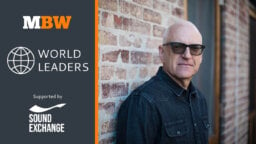The rapid growth of podcasting on Spotify over the past 12 months, fuelled by a mega-resource allocation to the format, has seen significant changes to the platform and its original USP, music listening.
With the millions of dollars the world’s leading music streaming platform is investing in podcast companies (plus original podcast content, and executives) will the likes of Spotify’s ‘Audio First’ strategy – combined with moves being made in this space by rivals like Deezer and Apple Music – ultimately result in podcasts challenging the “share of ear” for music consumption?
Universal Music Group Executive Vice President of Content Strategy and Operations, Barak Moffitt (pictured), believes so, and has said that the world’s largest music company “is keeping an eye” on the format for this very reason.
The surrounding context: according to Nielsen data, the average time U.S. music fans say they spend listening to music each week has dropped from 32.1 hours in 2017 to 26.9 hours in 2019 — a decline, you might suggest, that has been materially affected by Spotify’s push of podcasts on its service.
Speaking on the Adage Ad Lib podcast last week, Moffitt gave an insight into UMG’s content strategy which, to a large extent, involves making its own podcasts.
Moffitt was promoted to UMG’s Executive Vice President of Content Strategy and Operations in 2016 to ‘maximize revenue and create new commercial opportunities for audio-visual content across brands, direct-to-consumer experiences, live events, merchandise and licensing’.
According to Moffitt, “at current rates of consumption and rates of growth, [podcasts] could potentially rival the share of ear for music consumption, so obviously that’s something we are keeping our eye on”.
“That’s why we want to be in it while it’s in this developing stage,” he added. “That’s part of the reason why we really felt like [Wondery founder Hernan Lopez] would be a good partner. His background in television; Fox International and the way that is a lens on how he sees this opportunity just fits really well with where we are.
UMG entered into a partnership with independent podcast publisher Wondery in April to develop premium original podcasts, with podcasts produced under the agreement to be accessible globally on any platform Wondery makes its content available.
Wondery was launched in 2016 by CEO Hernan Lopez, who enjoyed an 18-year career at Fox and in 2010 was promoted to President & CEO of Fox International Channels, a $3 billion division overseeing television channels, production houses, and digital assets globally.
“Podcasting as an example, is an opportunity for us at a lower cost to develop film and TV ideas, which is a part of what we would like to do with Wondery where there could be a derivative life to the stories that we tell in the spoken word space.”
Barak Moffit
UMG’s podcast strategy, says Moffitt, ties into the company’s wider growth strategy, in which video plays a huge role.
“Podcasting as an example, is an opportunity for us at a lower cost to develop film and TV ideas, which is a part of what we would like to do with Wondery where there could be a derivative life to the stories that we tell in the spoken word space,” he said.
“The other opportunity there is to reach audiences who may not remember that they love music, but they’re in the spoken word or podcasting ecosystem. One of the things we’d love to do is to start ageing up the streaming subscriber base and to ensure that our catalog is enjoying as much connection with fans in the streaming economy as possible.”
Added Moffitt in the podcast: “How can we take that powerful storytelling we have in the audio-visual space and extend ourselves into areas of time in the attention economy that consumers are spending outside of just pure streaming services and music?
“That includes podcasting. But it also includes linear broadcast television and paid television which are still the largest segments of the screened entertainment market combined.”
Before being promoted into his current role, Moffitt ran Capitol Studios and Mastering in Hollywood for many years and leveraged the studios as strategic business units for UMG and its artists.
Before joining UMG, he worked as a senior executive at EMI, where he led major strategic initiatives in rights management, studios and production, music publishing and technology.Music Business Worldwide





